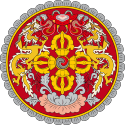- National Council of Bhutan
-
National Council of Bhutan
འབྲུག་གི་རྒྱལ་ཡོངས་ཚོགས་སྡེ་
Druki Gyelyong TshogdeType Type Upper house Leadership Chairperson of the National Council Lyonpo Namgye Penjore
since 31 December 2007 & 29 January 2008Members 25 Political groups Non-partisan (20)
Appointed (5)Elections Last election 31 December 2007 & 29 January 2008 Website Official Website of the National Council of Bhutan Bhutan 
This article is part of the series:
Politics and government of
Bhutan- Constitution
- King (List)
- Dratshang Lhentshog
- Parliament
- National Council
- National Assembly
- Royal Court of Justice
- Supreme Court
- High Court
- Dzongkhag Courts
- Dungkhag Courts
- Council of Ministers
- Dzongkhags (List)
- Political parties
- Elections
- Foreign relations
The National Council is the upper house of Bhutan's new bicameral Parliament, which also comprises the Druk Gyalpo (Dragon King) and the National Assembly. It is the subordinate house, and cannot author monetary or budget-related bills. Besides creating and reviewing Bhutanese legislation, the National Council acts as the house of review on matters affecting the security, sovereignty, or interests of Bhutan that need to be brought to the notice of the Druk Gyalpo, the Prime Minister and the National Assembly. Twenty members of the first Council were elected in the first ever elections for the Council held on December 31, 2007 and January 29, 2008.
Contents
Membership
The National Council consists of twenty-five members. Twenty members are elected by the electorates of the twenty dzongkhags, while five members are nominated by the Druk Gyalpo. The members cannot belong to any political party, and should have the minimum qualification of a graduation from a recognised university.[1] (Art. 11)
The members of the first National Council are generally young, many of them aged below 40. This is reportedly[2] due to the fact that only persons holding a degree were allowed to be candidates, and that access to formal education is relatively recent in Bhutan.
History
The National Council was preceded by the Royal Advisory Council (Lodey Tshogdey), mentioned in Bhutanese legislation as early as 1953.[3] From the outset, members of the Royal Advisory Council were concurrently members of the unicameral National Assembly (the Tshogdu; cf. Bhutan's modern National Assembly). The Royal Advisory Council was formally established in 1965 to advise the Druk Gyalpo and ministers and to supervise the implementation of programs and policies enacted by the National Assembly.[4] The Royal Advisory Council came to be a consultative and advisory body. Six members of the National Council were elected democratically, two were elected by the clergy, and one was nominated by the Druk Gyalpo to function as Chair.[4][3] Monk representatives, according to 1979 regulations for Council membership, were required to be literate and "highly knowledgeable about the Drukpa Kargyupa religion."[3] Monk nominees were subject to the approval of the speaker of the National Assembly. The regional representatives were elected by the National Assembly from a list endorsed by village assemblies.[3] They were required to be literate, knowledgeable about Bhutanese traditional culture and customs.[3] As the principal consulting body to the Druk Gyalpo, the Royal Advisory Council was a key state organization and interacted most directly with the National Assembly.[3]
The first Cabinet of Bhutan consisted of the Royal Advisory Council along with the Council of Ministers (now the Lhengye Zhungtshog).[4] Its members were collectively responsible to His Majesty the King and the National Assembly (Tshogdu).[4]
The National Council was established in 2008 under Article 11 of the Constitution of Bhutan, which does not mention the Royal Advisory Council. The subsequent National Council Act of 2008 codified the National Council's independent statutory basis.[5] Part of this framework included an explicit repeal of "all other laws in relation to the Royal Advisory Council."[5] The National Council Act sets forth qualifications; meeting, presentment, debate, and voting procedures; committee and rulemaking authority; and censure, removal, and other penalties for the members of the National Council.[5] The Act also establishes a Chairperson, a Deputy Chairperson, and a royally appointed Secretary General for the administration of the National Council.[5]
The first joint sitting of Parliament, including the National Council, was held from May 8 to May 30, 2008. The first session of the National Council was held from June 17 to July 24, 2008.[6]
References
- ^ "Constitution of the Kingdom of Bhutan (English)" (PDF). Government of Bhutan. 2008-07-18. http://www.constitution.bt/TsaThrim%20Eng%20(A5).pdf. Retrieved 2010-10-13.
- ^ "Main Bhutan election date is set", Subir Bhaumik, BBC, January 17, 2008
- ^ a b c d e f "Bhutan – Structure of the Government". Country Studies. Country Studies US. 2007-05-24. http://countrystudies.us/bhutan/46.htm. Retrieved 2011-01-02.
- ^ a b c d "Constitution of Bhutan". Constitutions of All Countries. Lucknow, India: City Montessori School. 2008-07-22. http://www.cmseducation.org/wconsts/bhutan.html. Retrieved 2011-01-02.
- ^ a b c d "National Council Act 2008" (PDF). Government of Bhutan. 2008. http://www.nationalcouncil.bt/images/stories/NC_Act_08_Eng.pdf. Retrieved 2011-01-02.
- ^ "About Us". National Council of Bhutan online. Government of Bhutan. http://www.nationalcouncil.bt/index.php/about-us.html. Retrieved 2011-01-02.
See also
- Parliament of Bhutan
- Tshogdu
- Constitution of Bhutan
- Politics of Bhutan
- Bhutanese legislation
External links
- "National Council of Bhutan". Government of Bhutan. http://www.nationalcouncil.bt/. Retrieved 2010-12-29.
Categories:- Bhutan stubs
- Parliament of Bhutan
- National upper houses
- 2007 establishments
Wikimedia Foundation. 2010.
